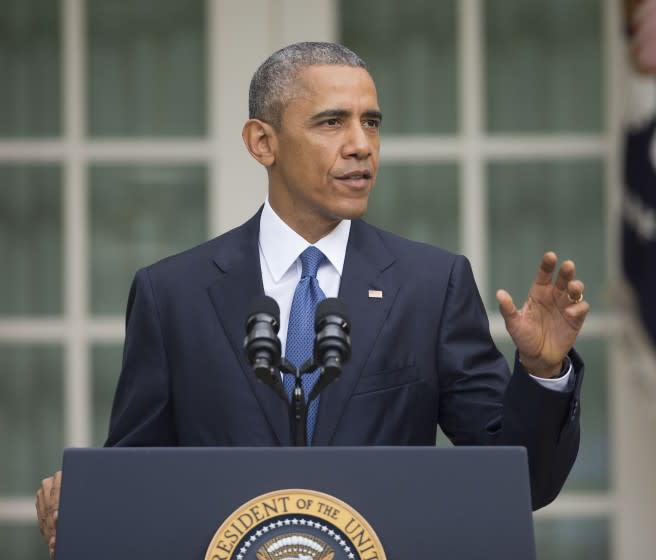What Barack Obama's memoir reveals about his long battle for healthcare reform

- Oops!Something went wrong.Please try again later.
The political battle for universal healthcare within the White House was long, epic and personal.
"Each time I met a parent struggling to come up with the money to get treatment for a sick child, I thought back to the night Michelle and I had to take three-month-old Sasha to the emergency room for what turned out to be viral meningitis," former President Barack Obama recalled in an excerpt from "A Promised Land," the forthcoming first volume of his memoirs of his time in the White House. The excerpt was published Monday in the New Yorker.
"I remembered the terror and the helplessness we felt as the nurses whisked her away for a spinal tap, and the realization that we might never have caught the infection in time had the girls not had a regular pediatrician we felt comfortable calling in the middle of the night," he continued. "Most of all, I thought about my mom, who had died in 1995, of uterine cancer."
The chapter — which offers an inside look into the passage of Obamacare at the end of the former president's first year in office — comes at a crucial moment for his signature piece of legislation, as its future could be threatened by the expected confirmation on Monday of Judge Amy Coney Barrett to the Supreme Court.
"In the middle of a pandemic, this administration is trying to dismantle the Affordable Care Act in the Supreme Court," Obama said on Twitter Monday while presenting the excerpt. "Here’s how Joe and I fought to expand healthcare, protect millions of Americans with preexisting conditions, and actually get it done.”
The journey toward passage was messy and prone to second-guessing, particularly from Obama's closest allies: David Axelrod, his advisor, and Rahm Emanuel his chief of staff, who warned him of the political hazards: "[This] can blow up in our faces."
In the middle of a pandemic, this administration is trying to dismantle the Affordable Care Act in the Supreme Court. Here’s how Joe and I fought to expand health care, protect millions of Americans with preexisting conditions, and actually get it done: https://t.co/U9RbHRLPBw
— Barack Obama (@BarackObama) October 26, 2020
Emanuel warned Obama that the process of getting the bill passed would lead to unpleasant compromises and a potentially huge backlash. “Making sausage isn’t pretty, Mr. President,” he told his boss. “And you’re asking for a really big piece of sausage.”
In another passage, Obama writes about the rise of the Tea Party movement, which became harder for him to ignore, especially when it resurrected an old rumor from Obama's campaign days: that he was Muslim and born in Kenya, which would have barred him from serving as president. This lie would eventually be used by Donald Trump to consolidate the base that would help make him Obama's successor.
"At the White House, we made a point of not commenting on any of this — and not just because [Axelrod] had reams of data telling us that white voters, including many who supported me, reacted poorly to lectures about race," Obama writes. "As a matter of principle, I didn’t believe a President should ever publicly whine about criticism from voters — it’s what you signed up for in taking the job — and I was quick to remind both reporters and friends that my white predecessors had all endured their share of vicious personal attacks and obstructionism."
A post shared by Barack Obama (@barackobama) on Sep 17, 2020 at 5:00am PDT
Obama also writes about how his administration tackled the H1N1 flu outbreak — just as they were dealing with two wars, a financial crisis and a push for healthcare reform.
"My instructions to the public-health team were simple: decisions would be made based on the best available science, and we were going to explain to the public each step of our response — including detailing what we did and didn’t know," he writes.
"A Promised Land" will be published Nov. 17, two weeks after the presidential election. The memoir will offer personal accounts of multiple landmark moments that occurred during the first term of Obama's presidency. The first of two planned volumes, it will end with the killing of Osama bin Laden.
This story originally appeared in Los Angeles Times.

